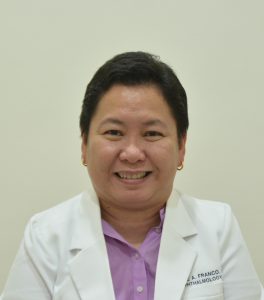Helping Hands:
Giselle’s Journey of Learning, Motherhood, and Mentorship
By Gina Estayo Gloria
Life may at times take us in different directions, but life too has a way of bringing us back to where we are supposed to be. Just ask Giselle Alikpala-Franco.
Giselle was a genius in her own right, seen as one of the best and brightest in Assumption. After high school, she joined the pioneer batch of UP College of Medicine’s Integrated Arts and Medicine (INTARMED) program, which according to her “aimed to produce more holistic doctors”. INTARMED opened some doors for Giselle, who decided to specialize in Ophthalmology and married her best friend in medical school.
“Our sense of sight has a profound effect on the quality of life and I wanted to help patients see better,” Giselle said when talking about why she pursued her chosen field.

The sense of “caring” was evident with Giselle, who stopped her practice to care for her son Joaquin and her daughter Beatriz. Giselle found joy in motherhood, more than she initially expected. Besides, that’s where she found the beauty in the struggle.
“Sure, there were a lot of sleepless nights and very long days of feeding-bathing-cleaning up- eachingcooking,” she said, “but I would do it all over again if I could.”
When her children got older, Giselle eventually returned to her practice, which she did on weekends. Eventually, she was invited to join the faculty of the Ateneo School of Medicine and Public Health (ASMPH).
“I never considered a career as a teacher when I was younger., Giselle recalled. “I thought I did not have the patience for it. But I guess motherhood was a good preparation.”
Right now, Giselle is the chairperson for second year med students and of course, she teaches Ophthalmology to medical interns who are assigned to a barangay health center in Quezon City.
“Together, we serve thousands of patients who would ordinarily not be able to afford specialty consultations,” she said in describing what she does. “I consider it a privilege to accompany our young doctors-to-be in this part of their journey. It is my fervent hope that they become men and women, doctors, for others, working in the service of the Filipino people.”
Looking back, Giselle has gone through and learned quite a lot in her time as a doctor, mother, doctor again, and as a member of the academe. The medical lessons are obvious, but the life lessons have been equally important not just for her students, but also for herself.


“A few years ago,” she recounted, “I approached one of my students after a small group discussion. She was previously very timid and quiet, but that particular morning, she was much more engaged, and I could sense that she had put a lot of work in preparing for the activity. I went to her, praised her for doing very well that day, and hoped that she would keep up the good work. I thought nothing of it and went about doing my work for the rest of the day. Later that night, she messaged me and thanked me profusely for the kind words and encouragement. She had been having a bad week at home and her studies became her escape. I had no idea what she was going through. While I did not think much of saying a few words to her, apparently those words came at a most opportune time for her.”
All things considered; things have come full circle for Giselle. As both a mother and a doctor, care has become a fixture in her life. Sure, life will have its ups and downs, but remembering her “why” has kept her from wavering in her goals.
“There will be a lot of times when you will find yourself questioning why you are doing this,” Giselle said. “But if becoming an instrument of healing is what you aspire for, then persist. The rewards are unparalleled.”
Copyright © 2025 Assumption Alumnae Association
